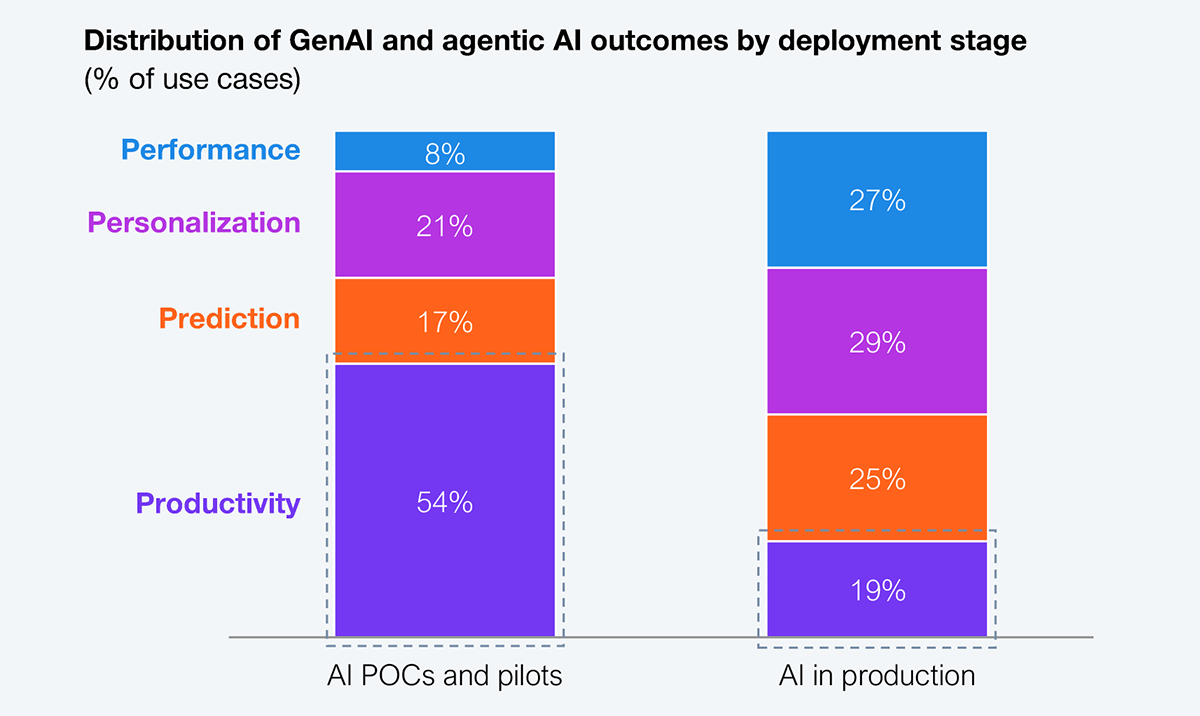Enterprises are confronting a disquieting paradox: over 80% of GenAI deployments are chasing prediction and personalization, while the original promise of productivity is languishing as pilots scale to production (see Exhibit 1). For operations leaders in information services, this widening intent-to-impact gap sustains manual effort, inflates costs, and throttles insight. WNS InfoTurf.ai seeks to bridge this gap by translating generative intelligence into measurable throughput and tangible business impact.

Sample: 979 GenAI and agentic AI use cases collected by HFS in the last 12 months
Source: HFS Research, 2025
Information businesses such as financial data providers and compliance platforms still depend on laborious, high-cost sourcing and integration models. Manual ingestion means costs are overshot, refresh cycles are slowed, and trade-offs are made between coverage and speed. InfoTurf.ai simplifies these workflows with unified automation for research, extraction, summarization, and publishing, effectively streamlining them under the framework through integrated automation modules (see Exhibit 2). Also, its modular nature allows customers to directly implement specific offerings into current ecosystems with custom features or use the platform end-to-end. For enterprise operations leaders, this means deploying specific capabilities or just adopting the complete platform. The InfoTurf.ai framework reconciles automation with accountability. Human-in-the-loop governance influences initial implementation, while validation agents control accuracy and reprocessing outcomes. Human-in-the-loop is not just limited to validation but also helps in training the AI engine, becoming more smarter with time. Bounded ingestion parameters and audit trails reinforce trust in all output, primarily through regulated domains. The platform’s configurator turns AI into a pre-, mid-, or post-processor based on areas that require some degree of automation.

Source: InfoTurf.AI functional capabilities depicted by WNS
InfoTurf.ai’s implementations across publishing, consulting, compliance, and investment management demonstrate consistent, verifiable impact:
Each example is in live production, with human supervision scaling back as accuracy exceeds the defined normal. At the same time, orchestrating agents, propagating accuracy across steps, and real-time monitoring are still maturing domains. The solution is still relevant and sensible but must be proven in every client context. Also, the aforementioned results should not be taken at face value.
Enterprises are reluctant to scale GenAI due to economic insecurity and/or governance complexity. WNS offsets these in both cases through unit-transaction pricing, requiring clients to pay only for verified outputs. Productivity gains often pay for increased customization, generating self-financing growth models where incentives are tied directly to measurable benefits. Adoption is enhanced by deployment flexibility.
InfoTurf.ai supports Azure OpenAI, AWS, and Google Cloud, secure on-premises environments, and enterprise-grade authentication and compliance. Its microservices architecture facilitates selective adoption of specific accelerators (auto-publishing, data summarization, etc.), rather than in isolation, without impacting systems. This modularity makes AI an operational layer that supplements existing infrastructure instead of redesigning it.
Real-time, provenance-rich information is now a baseline expectation. Business leaders implementing GenAI in information services should focus on three priorities:
InfoTurf.ai’s client record shows that GenAI-driven productivity is a tangible, repeatable outcome when technology, process, and governance advance together. It provides a pragmatic path to realizing intent, combining modular automation, validation-driven accuracy, and transaction-based economics. The smart move for business and operations leaders is to test the platform’s efficacy before deploying it.
Register now for immediate access of HFS' research, data and forward looking trends.
Get StartedIf you don't have an account, Register here |
Register now for immediate access of HFS' research, data and forward looking trends.
Get Started